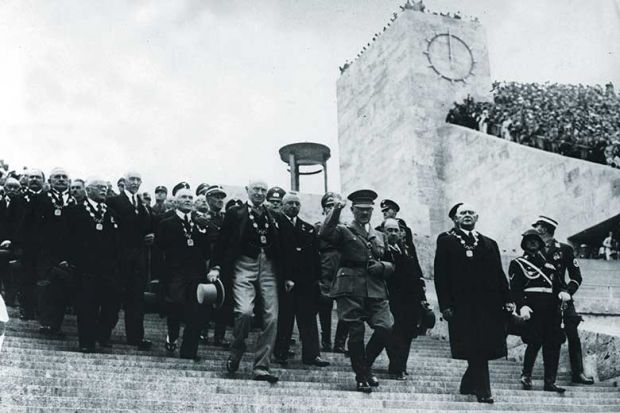As gravity bends light, so power bends time.” This is the central idea at the heart of Christopher Clark’s latest book, Time and Power. “I am interested”, he explains, “in how those who wielded power justified their comportment with arguments and behaviours that bore a specific temporal signature.”
Time has long been an important concept for historians, aware as they are that time is something collectively experienced and socially constructed. Clark provides food for thought in examining how leaders establish new narratives about the present’s relationship to the past and future in order to enhance their power and further their agendas. Time can be presented in varying ways, he shows. Is the future moving towards the present or receding away from it? Does the past threaten to encroach on the present, or does it fall away towards the edges of awareness? Is the present experienced as movement or as stasis? The “warping of temporality by power” – in other words, the emphasis on certain aspects of time by leaders – has a legitimating function.
Taking readers from the Thirty Years War to the fall of the Third Reich, Time and Power homes in on four key figures from German history – Friedrich Wilhelm of Brandenburg-Prussia (the Great Elector), Frederick the Great, Otto von Bismarck and Adolf Hitler – making the case for how their regimes embody unique conceptions of time. The Great Elector “leaned into the future and away from the past”, seeking to undermine the power of those who had experience in the past. Frederick II aimed to promote a sense of timelessness as a way of countering the social changes that were transforming his kingdom; Bismarck emphasised the unpredictability of history and therefore the importance of having a skilled decision-maker such as himself at the helm; while the Nazis presented their movement as a complete break from the immediate past but appealed to a nostalgic remote past and a utopian Germania in the future to sell their vision. Each regime therefore had its preferred temporal emphasis.
The notion that time is a powerful concept for rulers is helpful for understanding recent political developments across the globe. The Brexit campaign, fought under the slogan “take back control”, was, Clark explains, “animated by the appeal to an idealised past in which the ‘English-speaking peoples’ had effortlessly dominated the world”, making Britain’s imperial past seem more recent than the reality. And in the 2016 US presidential campaign, instead of suggesting that better lives lay ahead for people through change and modernisation, Trump argued that to “Make America Great Again” required it to reach back to a past where its values were still intact.
Based on the Lawrence Stone Lectures that Clark delivered at Princeton University in 2015, Time and Power is written for specialists, and it shows. His breadth of knowledge is impressive and his conclusions are carefully considered, but his lexicon makes for a tough read, which will sadly diminish the reach of his significant message. Clark’s work is nevertheless extremely important in showing the elastic and effective use of time by those in power, giving us helpful tools for making sense of political developments in both the past and the present.
Hester Vaizey is a fellow of Clare College, Cambridge and the author of Born in the GDR: Living in the Shadow of the Wall (2014).
Time and Power: Visions of History in German Politics, from the Thirty Years’ War to the Third Reich
By Christopher Clark
Princeton University Press
312pp, £24.00
ISBN 9780691181653
Published 5 February 2019
后记
Print headline: Every ruler has to reset the clock


